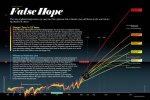- Joined
- Jan 28, 2013
- Messages
- 94,823
- Reaction score
- 28,342
- Location
- Williamsburg, Virginia
- Gender
- Male
- Political Leaning
- Independent
Here Steve McIntyre reviews some issues and difficulties with archiving and presentation of a specific proxy data set. Of note is another instance of splicing observed temperature data onto proxy data when the proxy data goes the "wrong" way. The backstory is also instructive in showing how difficult it is to gain access to data.
https://climateaudit.org/2016/08/13/esper-et-al-2016-and-the-oroko-swamp/
Jan Esper, prominent in early Climate Audit posts as an adamant serial non-archiver, has joined with 17 other tree ring specialists, to publish “Ranking of tree-ring based temperature reconstructions of the past millennium” (pdf). This assesses 39 long tree ring temperature reconstructions. The assessment is accompanied by an archive containing 39 reconstruction versions, together with the underlying measurement data for 33 of 39 reconstructions. (It seems odd that measurement data would continue to be withheld for six sites, but, hey, it’s climate science.)
Because I’ve been recently looking at data used in Gergis et al, I looked first at Esper’s consideration of Oroko, one of two long proxies retained in Gergis screening. I’ve long sought Oroko measurement data, first requesting it from Ed Cook in 2003. Cook refused. Though Oroko reconstructions have been used over the years in multiproxy studies and by IPCC, the underlying measurement data has never made archived The archive for Esper et al 2016 is thus the very first archive of Oroko measurement data (though unfortunately it seems that even the present archive is incomplete and not up-to-date).
Despite claims to use the most recent reconstruction, Esper’s Oroko temperature reconstruction is decidedly out of date. Worse, it uses a n Oroko “reconstruction” in which Cook replaced proxy data (which went down after 1960) with instrumental data (which went up) – in a contemporary variation of what is popularly known as “Mike’s Nature trick”, though Mike’s Nature trick, as discussed at CA here, was a little different.
In today’s post, I’ll look at the “new” Oroko data, which, needless to say, has some surprises. . . .
https://climateaudit.org/2016/08/13/esper-et-al-2016-and-the-oroko-swamp/
Jan Esper, prominent in early Climate Audit posts as an adamant serial non-archiver, has joined with 17 other tree ring specialists, to publish “Ranking of tree-ring based temperature reconstructions of the past millennium” (pdf). This assesses 39 long tree ring temperature reconstructions. The assessment is accompanied by an archive containing 39 reconstruction versions, together with the underlying measurement data for 33 of 39 reconstructions. (It seems odd that measurement data would continue to be withheld for six sites, but, hey, it’s climate science.)
Because I’ve been recently looking at data used in Gergis et al, I looked first at Esper’s consideration of Oroko, one of two long proxies retained in Gergis screening. I’ve long sought Oroko measurement data, first requesting it from Ed Cook in 2003. Cook refused. Though Oroko reconstructions have been used over the years in multiproxy studies and by IPCC, the underlying measurement data has never made archived The archive for Esper et al 2016 is thus the very first archive of Oroko measurement data (though unfortunately it seems that even the present archive is incomplete and not up-to-date).
Despite claims to use the most recent reconstruction, Esper’s Oroko temperature reconstruction is decidedly out of date. Worse, it uses a n Oroko “reconstruction” in which Cook replaced proxy data (which went down after 1960) with instrumental data (which went up) – in a contemporary variation of what is popularly known as “Mike’s Nature trick”, though Mike’s Nature trick, as discussed at CA here, was a little different.
In today’s post, I’ll look at the “new” Oroko data, which, needless to say, has some surprises. . . .

